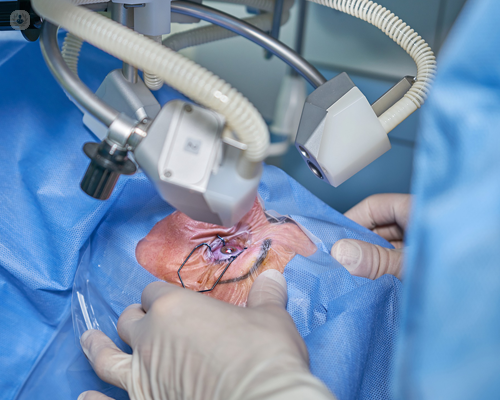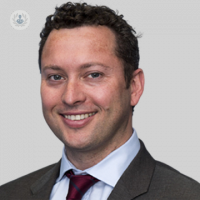What to expect from cataract surgery
Written by:Having any kind of eye operation can be an unnerving prospect. When it comes to cataracts, it’s no different. Expert reassurance about the procedure can be extremely helpful.
Here to provide further information about cataract surgery, including how to best prepare for it, how long it lasts and the recovery period, is leading consultant ophthalmologist Mr Geraint Williams.

How can I prepare before cataract surgery?
The best thing that we can do to prepare before cataract surgery is to make sure that the ocular surface and the eye health is optimised. Often, in the clinic we will have look and decide whether, for example, you have any dry eye problems that need to be addressed and these will be reasonably treated in anticipation of the surgery itself. For most patients, however, there isn't anything particular that one needs to do other than to make sure that contact lenses, for example, are removed a couple of weeks prior to surgery and that any new problems are conveyed to the surgeon in advance.
How long does it last?
Cataract surgery typically involves somebody coming in, for a morning or afternoon, usually for a couple of hours to get all the preparation done, including checking you, making sure that the pupil is dilated and so forth. The surgery itself varies from person to person, but typically you'll be in the operating theatre setting for about 20 to 30 minutes with the surgery taking 10 to 15 minutes. It can vary depending on how complex the condition associated with the cataract is.
Are you awake during cataract surgery? Is the procedure painful?
In the vast majority of patients, cataract surgery is done while you're awake, either with drops to numb the eye or sometimes an injection is placed around the side of the eye. This sometimes means that patients are able to see some things during the surgery, but very typically, studies have shown that this is a lot of flashing lights and kaleidoscopic movement. These aren't something that tends to cause anybody distress.
The procedure itself isn't painful and sometimes, if people do feel anything during the course of the surgery, they can squeeze the hand of the assistant who's holding it, just to let us know that you may need some extra drops to help numb the eye a little bit more to get you through to the end of the operation itself.
Is it necessary to stay overnight after cataract surgery or will I go home afterward?
Most patients don't need to stay overnight after cataract surgery. As I mentioned earlier, patients will typically come in for a morning or afternoon, and once the surgery is completed, and the nurses have gone through all the drops and steps that are needed to go home, we would send you home the same day.
What does the recovery period look like?
The recovery period is usually fairly quick because of the drops and obviously having an operation itself, the eye is typically a bit blurry for a few days. We would expect, however, that the vision is brighter the next day, we would also expect that, whilst the eye might be a little bit gritty, that it typically isn't painful and whilst it might be a little bit pink, the eye isn't usually very red or bloodshot.
It's very important, of course, that in the first few days that if anything changes either in terms of pain or discomfort or redness, or indeed a reduction in the vision, that you would contact us as a matter of urgency. Thankfully, this situation only happens in a very tiny minority of patients.
If you’re considering cataract surgery and want the best care for your eyes, the expertise Mr Williams can offer is available via consultation. Arrange an appointment on his Top Doctors profile.


